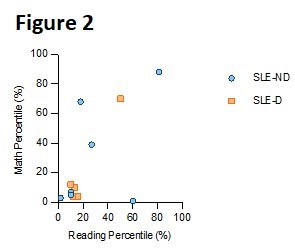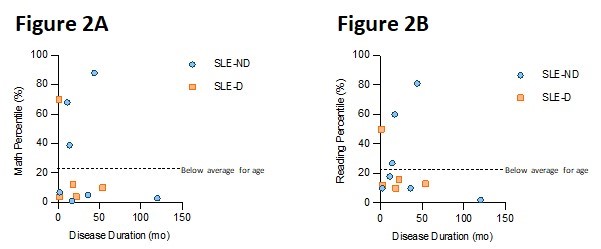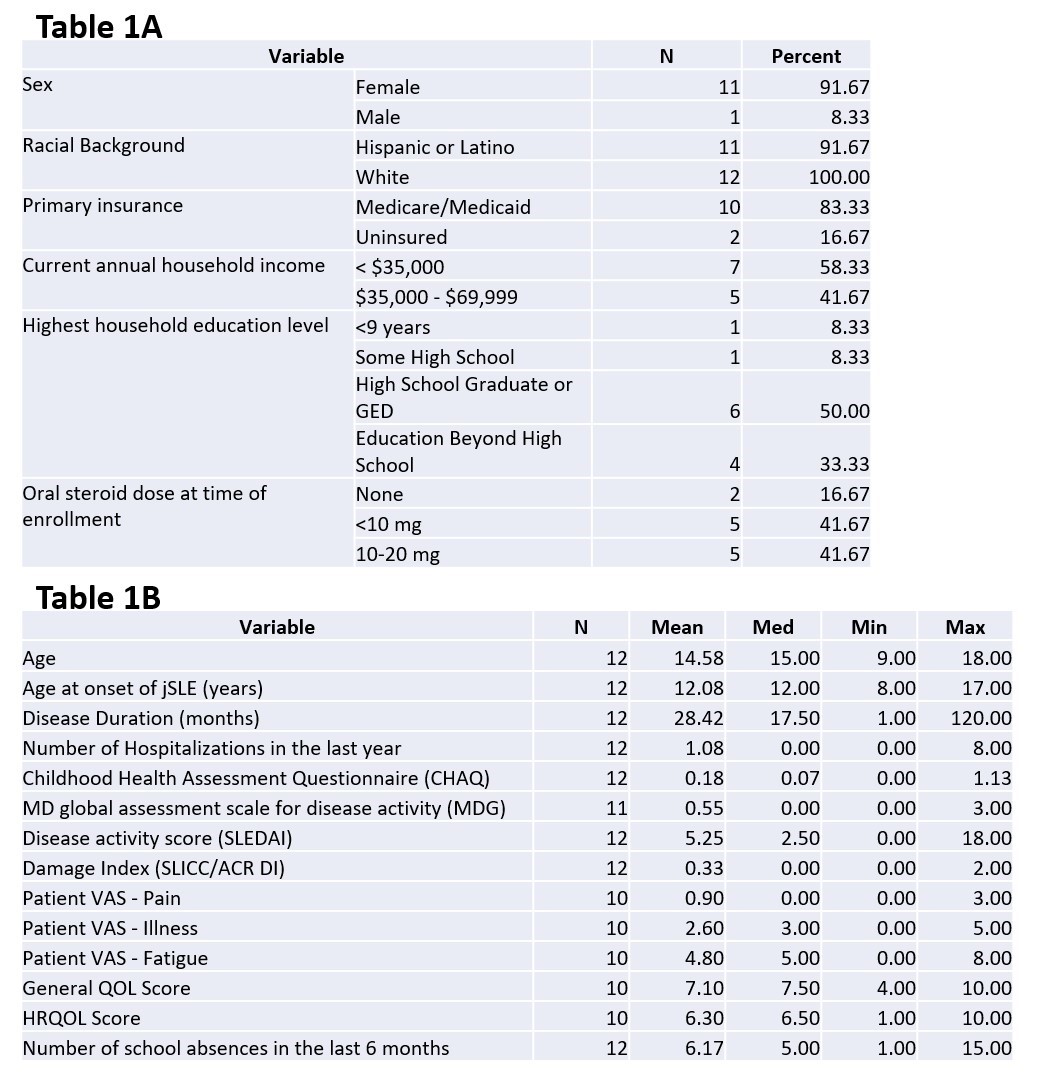Session Information
Date: Monday, November 13, 2023
Title: (1221–1255) Pediatric Rheumatology – Clinical Poster II: Connective Tissue Disease
Session Type: Poster Session B
Session Time: 9:00AM-11:00AM
Background/Purpose: Children with juvenile-onset SLE (jSLE) have high rates of depression.1-2 Adolescents with depression, but without a chronic illness, have lower academic engagement, efficacy, and school functioning.3 While academic outcomes have been studied in children with jSLE, no studies have explored the associations between depression and academic outcomes in this population. 4 This pilot study aimed to evaluate the relationship between depressive symptoms and executive function and academic outcomes in jSLE.The study also explored the relationship of depressive symptoms to other disease/patient-specific variables, including age at onset, disease duration, and disease activity.
Methods: jSLEpatients, 9-18 years of age, completed the Wide Range Achievement Test 5th Edition (WRAT5) and the Center for Epidemiological Studies – Depression Scale (CESD). Their parent completed the Behavior Rating Inventory of Executive Function 2nd Edition (BRIEF2) and a questionnaire gathering demographics and academic performance. The SLEDAI and SLICC/ACR Damage Index, were obtained. Two-sample T-test was used to identify associations between depressive symptoms and academic outcomes, including WRAT5 and BRIEF scores, and disease/patient-specific variables.
Results: Of the 12 patients enrolled, 42% screened positive for significant depressive symptoms.Forty percent of patients who screened positive for depressive symptoms reported receiving mental health treatment. The WRAT5 mean math computation and reading composite percentile ranks were higher for participants without significant depressive symptoms (SLE-ND) compared to those with significant depressive symptoms (SLE-D), but this difference was not significant (see figure 1). The mean BRIEF Initiate scale percentile was higher for participants with significant depressive symptoms compared to those without, but this difference was also not significant. Patients with significant depressive symptoms tended to be older at disease onset and have shorter disease duration (see figures 2A-B).
Conclusion: Depressive symptoms, often untreated, were common in this cohort with jSLE. While there may be clinically meaningful differences in academic outcomes in jSLE patients with significant depressive symptoms, the small sample size precluded us from detecting significant differences. However, this pilot study demonstrated the feasibility of administering tools to assess depressive symptoms, executive function, and academic outcomes in jSLE. Larger studies are needed to better understand these trends.
- Knight AM, et al. Depression risk in young adults With juvenile- and adult-onset LUPUS: Twelve years of followup. AC&R. 2018;70(3):475-480.
- Knight A, et al. Identifying differences in risk factors for depression and anxiety in pediatric chronic disease. J of Ped. 2015;167(6):1397-1403.
- Jaycox LH, et al. Impact of Teen depression ON ACADEMIC, social, and physical functioning. Ped. 2009;124(4):596-605.
- Zelko F, et al. Academic outcomes in childhood-onset systemic lupus erythematosus. AC&R. 2012;64(8):1167-1174.
To cite this abstract in AMA style:
Bradfield H, Sparagana P, Sloan E, Jo C, Wright T, Frierson S. The Associations Between Depressive Symptoms and Executive Function and Academic Outcomes in Children with SLE [abstract]. Arthritis Rheumatol. 2023; 75 (suppl 9). https://acrabstracts.org/abstract/the-associations-between-depressive-symptoms-and-executive-function-and-academic-outcomes-in-children-with-sle/. Accessed .« Back to ACR Convergence 2023
ACR Meeting Abstracts - https://acrabstracts.org/abstract/the-associations-between-depressive-symptoms-and-executive-function-and-academic-outcomes-in-children-with-sle/



